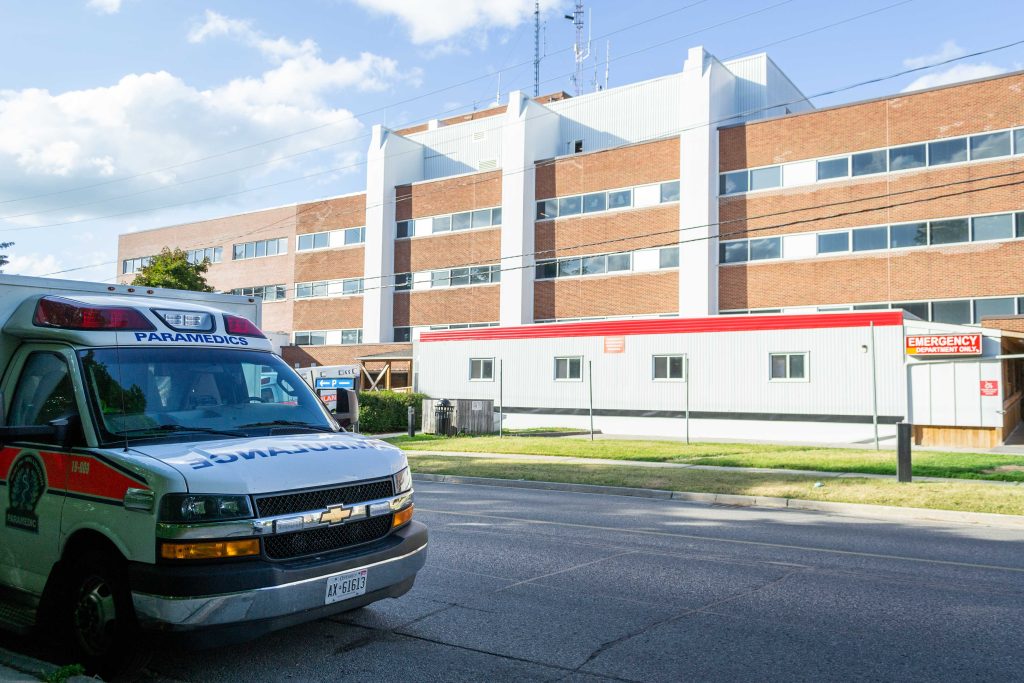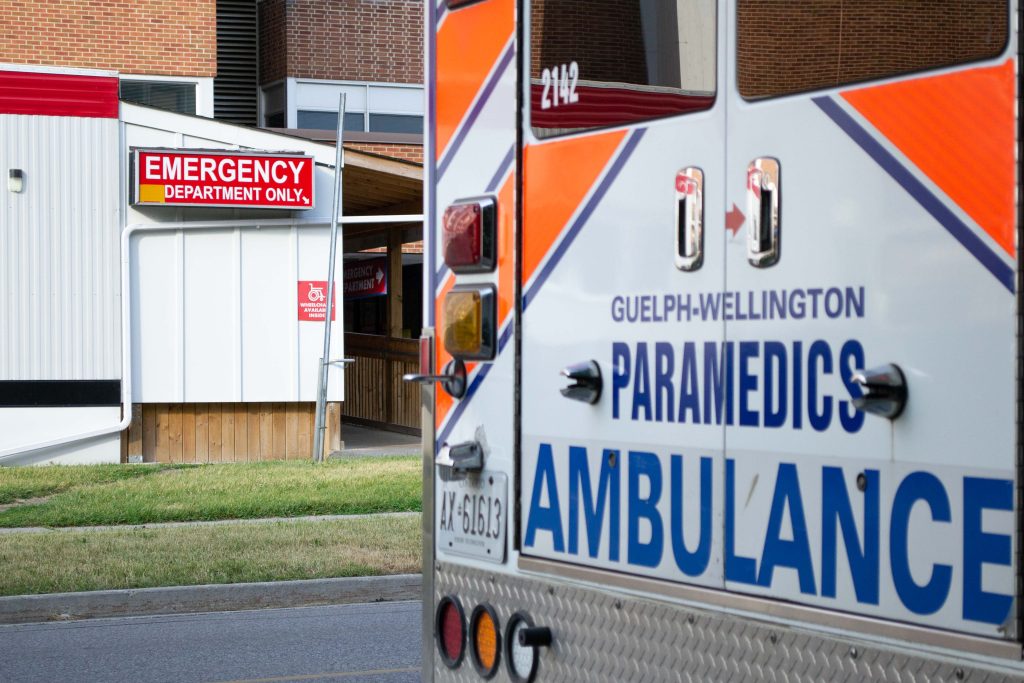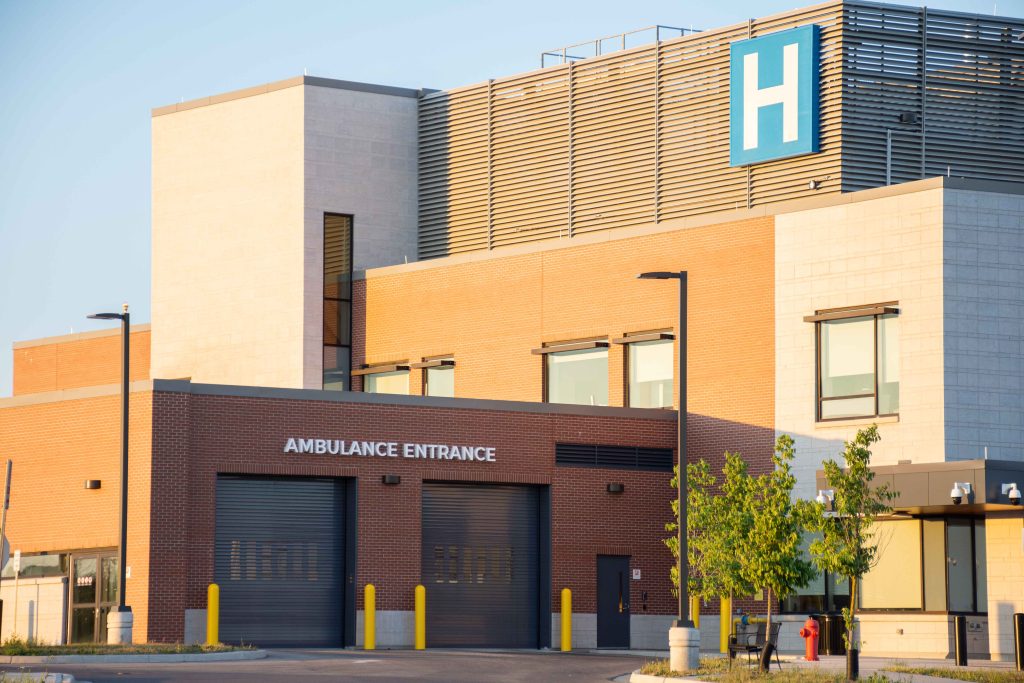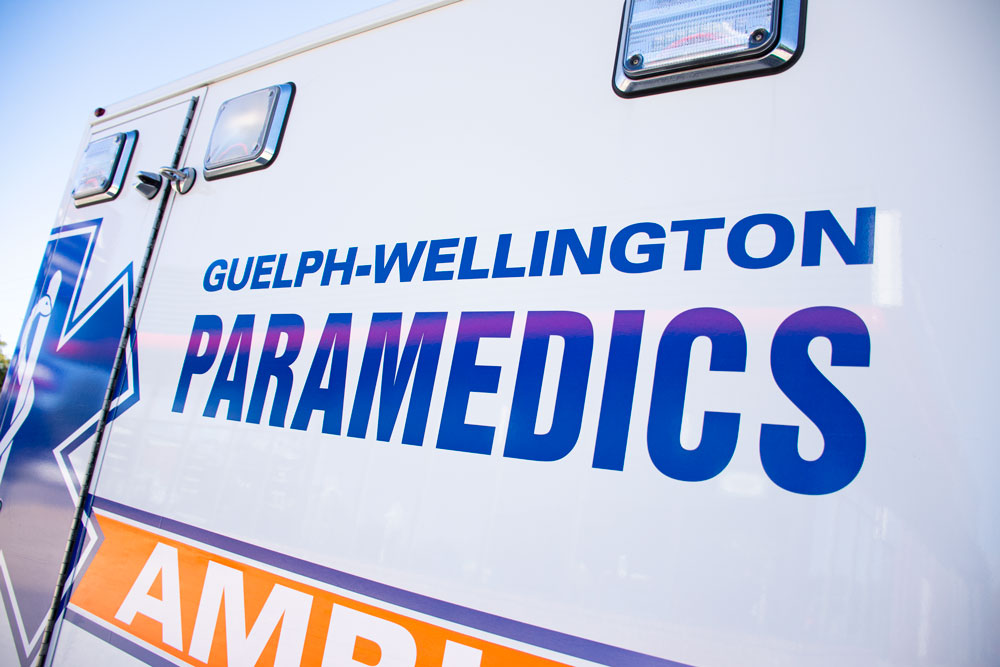GUELPH – “There’s hope on the horizon, but a long way to go.”
That’s what Guelph-Wellington Paramedic Services (GWPS) chief Stephen Dewar had to say during a June meeting of the county’s social services committee about finding solutions for lengthy offload delays at Guelph General Hospital (GGH).
Offload delays are experienced when patients arriving at hospital by ambulance are unable to be transferred into the care of hospital staff in a timely manner.
Until that transfer of care occurs, paramedics must remain with their patient, rendering them out of service and unavailable to respond to 911 calls.
According to GWPS data, paramedics spent 7,400 hours waiting around for a bed to free in GGH’s emergency department between Jan. 2021 and April 2022 – the equivalent of 616 12-hour shifts.
With fewer Guelph-based ambulances on the road, county-based paramedics are relocated to cover emergency calls within the city, reducing county coverage and lengthening response times here until an ambulance is freed to replace the county-based truck.
There were less than four ambulances available at least three times each day in the county and Guelph throughout May, according to a report from Dewar.
There were also two occasions – one lasting 16 minutes — where not a single ambulance was available to respond to a call in the county or Guelph.
“Offload delays are continuing to affect our service, consuming our resources and increasing our response times to other emergencies as we have less ambulances available,” Dewar said.
Paramedics sitting around, waiting
The Advertiser previously reported on 2021 offload delay data provided by the service.
In January 2021, paramedics spent 504 hours waiting on offload delays, with delays growing steadily throughout the rest of the year before peaking in October at 1,051 hours.
That month, crews waited 39 minutes to offload patients, and in 10% of cases, delays of 87 minutes and above were observed.
According to provincial standards, transfers are supposed to occur “within 30 minutes of the ambulance arriving at the hospital, 90 per cent of the time.”

A Guelph-Wellington Paramedic Services ambulance is seen parked in front of Guelph General Hospital, along Delhi Street, on June 29. The hospital’s triage space is currently configured into a temporary building during renovations. Photo by Jordan Snobelen
As of January 2022, an average offload delay lasted 33 minutes and 10 seconds at GGH, down from the previous four months.
In an email to the Advertiser, Dewar said “conditions have significantly worsened” since.
According to provincial data, the average offload delay at GGH in May was 70 minutes, with the longest stretching almost 10 hours.
Of 1,026 offloads at GGH that month, 318 (31%) lasted longer than an hour – the highest percentage seen between Feb. 2021 and May 2022.
Less than half (462) offloads were completed in under 30 minutes.
Councillor and committee member Campbell Cork said it’s “obscene” to have paramedics “basically sitting there.”
Although councillor Jeff Duncan doesn’t consider offload delays a waste of time – “because they’re with a patient that needs the care at that time” – he did say it’s a “very inefficient use of our resources.”
Guelph Mayor Cam Guthrie said the delays are “unacceptable” and a “very serious, urgent matter” needing to be addressed by the province.
“The election is out of the way, it’s time for the province to get to work,” the mayor remarked.
Why do offload delays occur?
Simplified, offload delays are a symptom of larger problems: a lack of hospital capacity and flow-through clogs.
The hospital emergency department can quickly become a bottleneck with patients streaming in faster than the hospital can handle them. Why that happens is more nuanced.
A patient who needs to be admitted to GGH may find themselves stuck in the emergency department waiting for a bed to open on a floor above.
But a patient occupying a bed on the floor above could also be stuck, no longer needing hospital intervention, yet waiting for a bed to become available at a long-term care home before being discharged, for example.
GGH spokesperson Perry Hagerman said in an email offload delays are a “very complex” issue.
“The availability of [long-term care] spaces is only one of a number of factors,” he stated.
Others, he added, include: a lack of available rehabilitation beds for patients to be discharged to, the complexity of a person’s illness affecting the duration of their admission, staffing shortages, and a lack of overall capacity within the hospital.

A Guelph-Wellington Paramedic Services ambulance is seen parked in front of Guelph General Hospital, along Delhi Street, on June 29. The hospital’s triage space is currently configured into a temporary building during renovations. Photo by Jordan Snobelen
Stephen Van Valkenburg, Region of Waterloo Paramedic Service chief and a director for the Ontario Association of Paramedic Chiefs, said paramedic services across the province have been dealing with offload delays for nearly two decades.
Van Valkenburg also co-chairs a recently formed subcommittee addressing the delays.
“We sit in the hallway with a patient, although the patient really should be the responsibility of the hospital once we come through that door,” Van Valkenburg said by phone, adding offloads have become “accepted practice” as hospitals have learned to rely on paramedics for “cheap babysitting.”
The subcommittee is drafting a single-page brief to be delivered to the province and paramedic services, highlighting key points surrounding the issue.
Van Valkenburg said the tone from the association is becoming more direct than it has been in the past.
“The solution lies with the government to come to the table to figure out how they can correct healthcare flow-through issues within the hospitals to be able to handle the patient load,” he said.
“We’ve done all we can as municipal services and we’re not going to take the responsibility; this is a government issue, this is a healthcare issue, and we’re pushing back a little bit on the government with that.”
‘Quickly overwhelmed’
The GGH emergency department has seen an average of 60,386 people each year – 15,386 more than the 45,000 patients it is designed to handle – for almost a decade, with the exception of 2020-21.
In early 2022, the emergency department was so overwhelmed Hagerman said there was no “capacity to treat critically ill patients” transported via ambulance.
Paramedics had to bypass GGH and transport their patients as far away as Palmerston and District Hospital (almost an hour away from Guelph) and Groves Memorial Community Hospital in Centre Wellington.

The ambulance entrance of Groves Memorial Community Hospital. Photo by Jordan Snobelen
Groves became “quickly overwhelmed,” according to Dewar.
Kate Kobbes, vice president of clinical services and chief nurse executive at the Wellington Health Care Alliance, said the increase in patients from Guelph and seen within county hospitals “hasn’t had a sustained impact on us” but did increase staff stress and wait times in the county.
“We did our best to manage in those times of increased acuity and numbers and provided care to all patients who came through our doors,” Kobbes said by phone.
Dewar said bypassing was used “sporadically” by GGH until being stopped on April 21.
“We did discuss this issue with GGH and agreed that this was not the intended use of the process, and that it was not in the best interests of patients in our community, so the process was discontinued,” Dewar stated in an email, explaining the bypass process is intended for emergencies such as a fire or disaster.
Exploring solutions
Depending on patients’ conditions, a crew of two paramedics could be responsible for providing hallway care for between six and eight patients caught on offload delays, Dewar told the committee.
Referred to as “batching,” it was the first time some councillors had heard of the approach, recommended by the province in February.
In an email to the Advertiser, Dewar admitted to “many significant concerns” with batching, including the quality of care, a lack of readily available assistance and resources if a patient’s condition worsens, and the strain on staff.
“In addition, paramedic training, knowledge base, and medical directives are designed for pre-hospital emergency care and shorter durations,” Dewar stated.
Although paramedics will do what they can under the circumstances, Dewar said batching “is not a longer-term or sustainable solution” and is being used to “address a hospital shortage issue.”
Prior to the June provincial election, GWPS and GGH officials were in talks with the province and local MPPs to discuss offload delays.
On April 13, Dewar and City of Guelph officials met with MPPs Ted Arnott and Mike Schreiner.
On April 14, letters from the MPPs were hand-delivered at Queen’s Park to former health minister Christine Elliott asking the province to pay attention and address offload delays.
Arnottletter
On April 25, Dewar and deputy chief Leanne Swantko, along with GGH officials, including GGH CEO and president Marianne Walker, met online with provincial emergency health services assistant deputy minister Susan Picarello.
GWPS, with the support of GGH, has asked the province to fund a dedicated offload nurse position.
According to Schreiner’s chief of staff Bianca Bell, the province “quickly amended their spring budget to include a promise of funding” for such a position.
The Ministry of Health confirmed in an email to the Advertiser that funding would be provided for a dedicated offload nurse in Guelph.
But Van Valkenburg, with the OAPC, cautions against getting too excited about dedicated offload nurses, calling it a “Band-Aid solution” only prolonging the issue and not fixing the root problem.
“If I added a second offload nurse to take another five patients, as soon as those five beds get taken, then again, I’m just back on offload,” Van Valkenburg said, explaining a “more holistic approach” is needed to solve “flow-through issues within the hospital system.”
“They don’t have physical space within the [hospitals] to actually hold these patients,” he reiterated.

Photo by Jordan Snobelen
Walker, GGH’s CEO, said addressing the issue at the hospital involves “collectively looking at all the things we put in place that helps emergency flow … it’s not one thing.”
“We need to open up additional beds so that we can accommodate … patients in our [emergency department] so we don’t have patients waiting there [on] ambulance offload,” Walker said by phone, adding she believes there could be space for an additional 12 medical and surgical beds.
Present outpatient clinic space would be converted to patient rooms, she explained, and an ask would be made of the province to provide operational funding for those beds, including staffing.
Since 2020, GGH has been able to open 30 additional beds in renovated spaces with provincial funding until April 2023, according to Walker.
In May, the province also announced at least $15 million in capital funding for a two-phase renovation of GGH’s emergency department over a period of several years.
Walker said phase one involves relocating emergency mental health and addictions services to another area, with an increase in beds, and the second phase will increase triaging and see-and-treat space “which will really help with flow in the emergency department.”
In the interim, Walker said staff are “doing their best” and acknowledged wait times in the emergency department can be burdensome.
New health minister appointed
At the committee meeting, county Warden Kelly Linton and Mayor Guthrie volunteered to address a second letter on offload delays to newly appointed deputy premier and health minister Sylvia Jones (formerly Ontario’s solicitor general), following an earlier letter addressed to former minister Elliott in March.
20220322_Dedicated Offload Nurse program
The “flare” had been sent up years ago on this issue, Guthrie told the Advertiser by phone.
“This has not been addressed at the provincial level to the degree that it needs to be,” he said.
A joint letter needs approval by Guelph council, but the mayor hopes council will consent to sending the letter at the end of July.
“I’m hopeful that the new minister is going to respond, and respond quickly, because it is an urgent matter,” Guthrie said.




